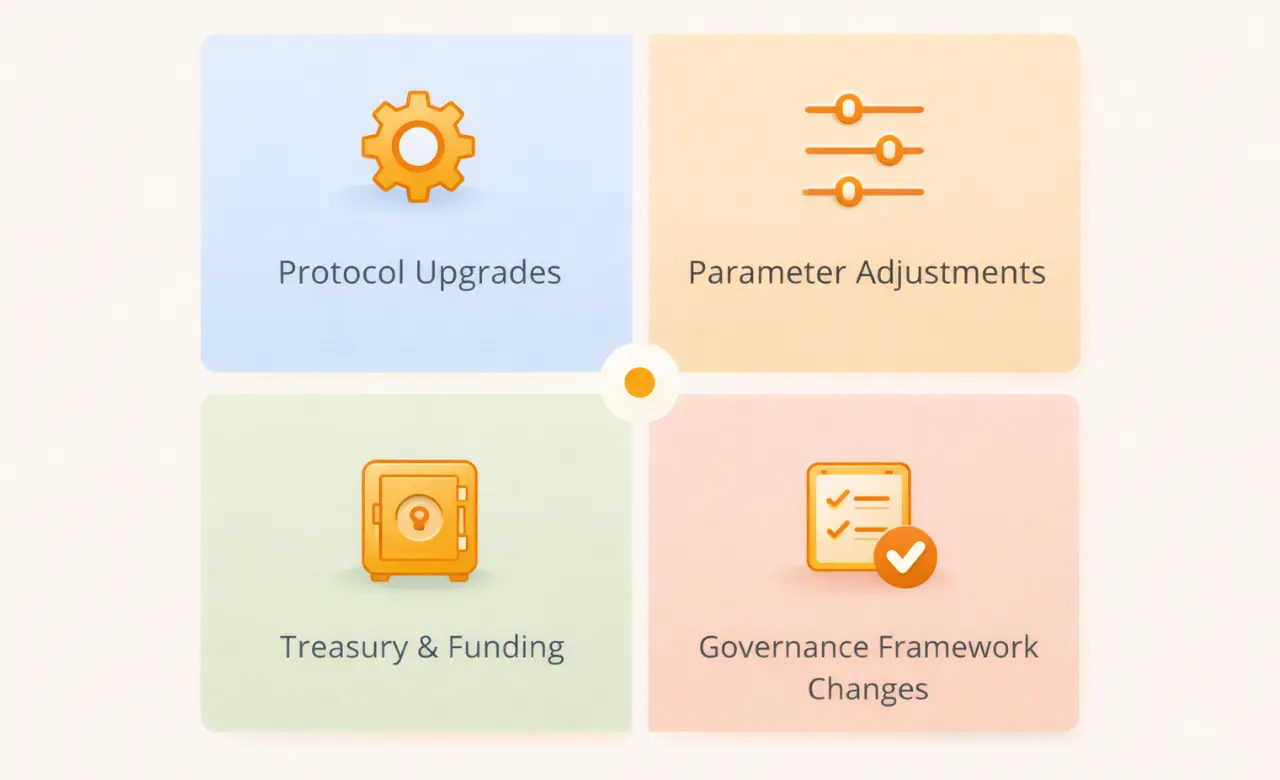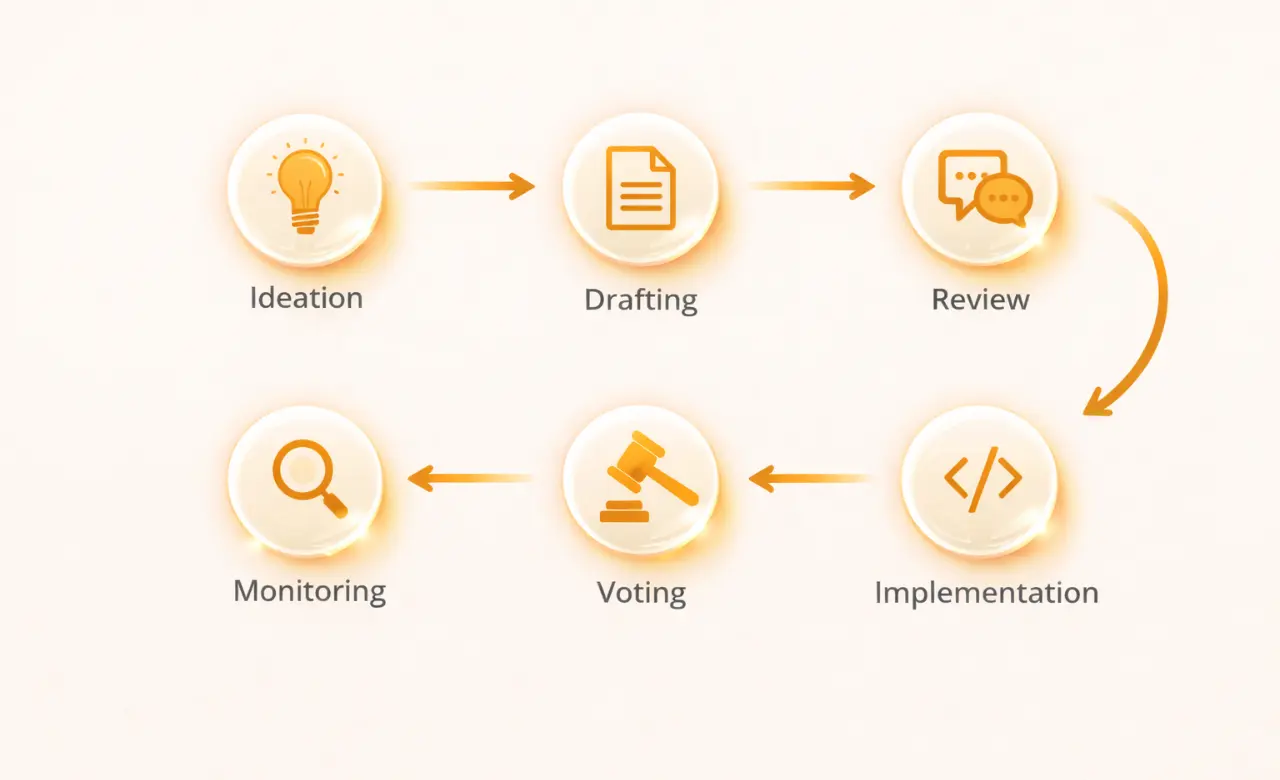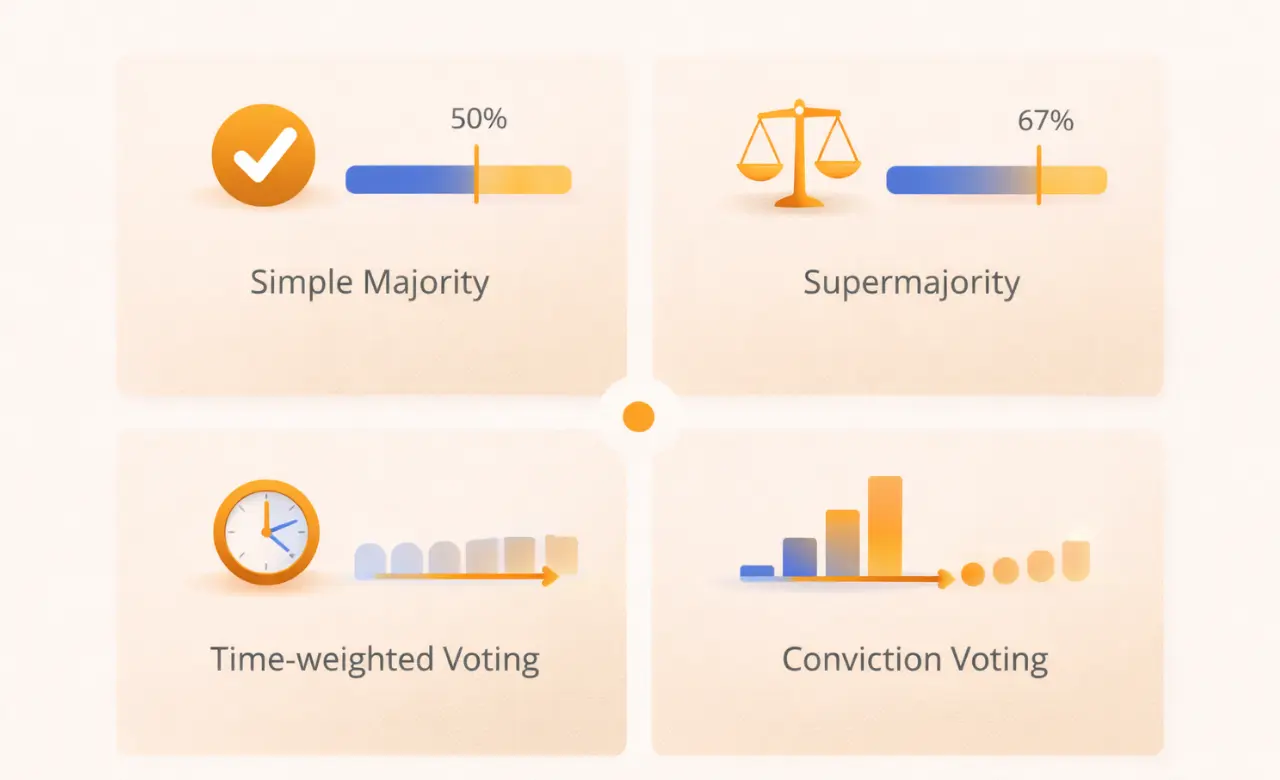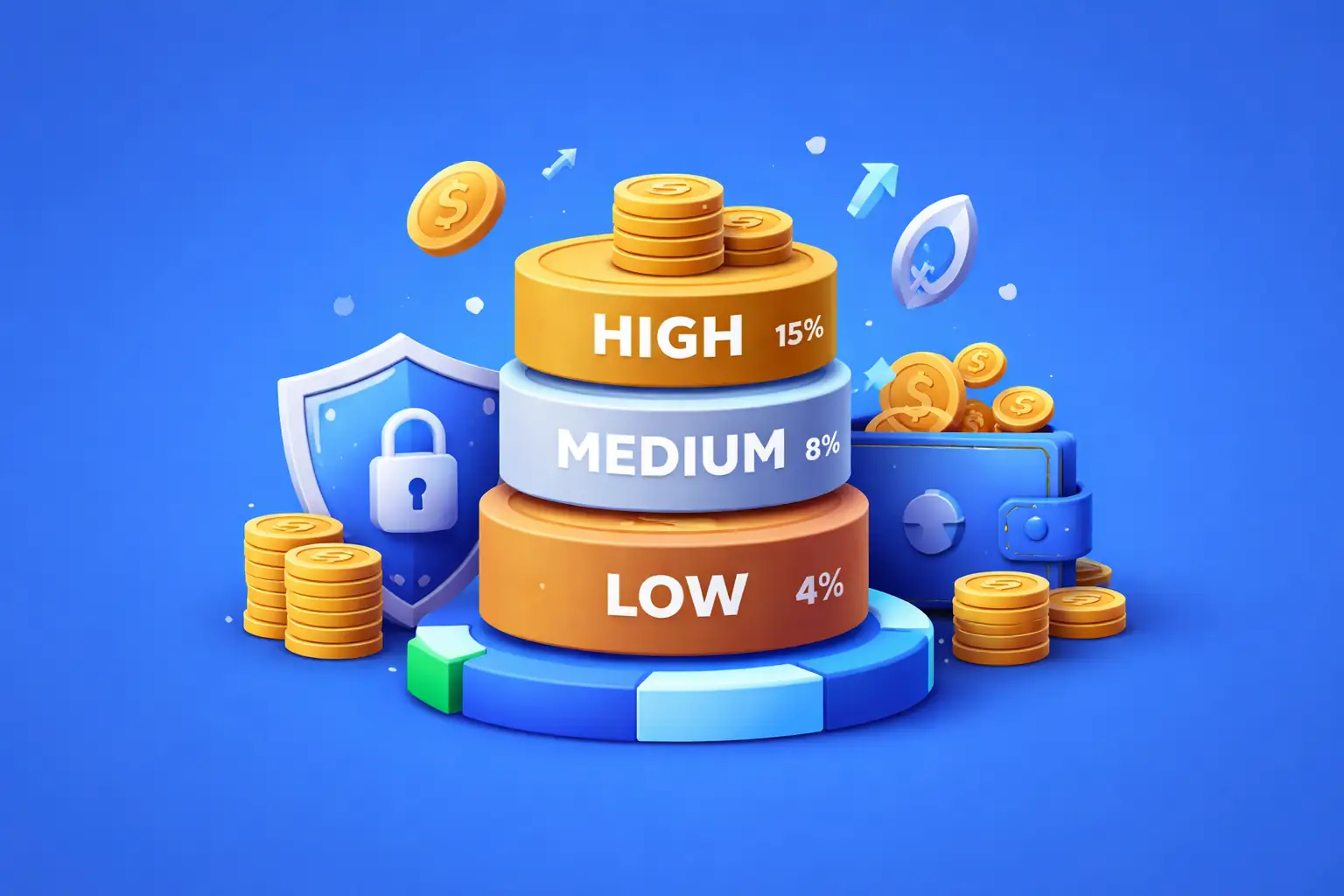Key Takeaways: Governance Proposals in DeFi
- Governance proposals in DeFi enable decentralized decision making without reliance on centralized authorities.
- Token holders directly influence protocol upgrades, parameters, and long-term strategy.
- Effective governance proposals follow structured lifecycles including ideation, review, voting, and execution.
- On-chain governance ensures transparent and automated execution of approved decisions.
- Off-chain and hybrid governance models improve participation and operational flexibility.
- Governance tokens align voting power with economic stake and long-term commitment.
- Security mechanisms such as time locks and quorum thresholds protect against governance attacks.
- Strong governance frameworks drive protocol stability, innovation, and sustainable ecosystem growth.
The decentralized finance landscape has revolutionized traditional financial systems by introducing trustless, transparent, and permissionless protocols. At the heart of this transformation lies a critical mechanism that ensures these platforms remain truly decentralized: governance proposals in DeFi. These proposals represent the democratic backbone of decentralized protocols, allowing stakeholders to collectively shape the future direction of projects without relying on centralized authorities.
Governance in DeFi ecosystems operates fundamentally differently from traditional corporate structures. Instead of a board of directors or executive team making unilateral decisions, DeFi governance proposals empower token holders to participate directly in decision-making processes. This participatory model ensures that protocol changes, upgrades, and strategic decisions reflect the collective wisdom and interests of the community rather than a select few individuals.
The emergence of governance mechanisms in decentralized finance represents a paradigm shift in how financial protocols evolve and adapt. Through carefully structured governance proposals in DeFi, communities can address bugs, implement new features, adjust economic parameters, and respond to changing market conditions in a transparent and accountable manner. This dynamic approach to protocol management has become essential for maintaining competitive advantage and ensuring long term sustainability in the rapidly evolving blockchain ecosystem.
What Are Governance Proposals in DeFi?
Governance proposals in DeFi are formal suggestions submitted by community members or core teams that outline specific changes, improvements, or actions to be taken within a decentralized protocol.
These proposals serve as the primary mechanism through which stakeholders can influence the development and operation of DeFi platforms. Each proposal typically includes detailed documentation explaining the rationale, implementation plan, potential risks, and expected outcomes of the proposed changes.
The structure of DeFi governance proposals generally follows a standardized format that ensures clarity and comprehensiveness. A typical proposal includes a clear title, abstract summarizing the main points, detailed specification of technical changes, analysis of potential impacts on the protocol, and a timeline for implementation. This structured approach helps community members understand exactly what they are voting on and makes informed decisions about supporting or rejecting proposals.
Understanding governance proposals for decentralized finance requires recognizing that these mechanisms go beyond simple voting systems. They represent a complete framework for collective decision making that includes discussion forums, formal submission processes, voting periods, implementation phases, and post execution monitoring. This comprehensive approach ensures that changes to DeFi protocols are thoroughly vetted, widely discussed, and carefully implemented to minimize risks while maximizing benefits for all stakeholders.
Why Governance Proposals Matter in Decentralized Finance
Democratic Control
Empowers communities with direct decision-making power over protocol evolution
Trust Building
Creates transparency and accountability in protocol management
Rapid Adaptation
Enables quick responses to market changes and emerging challenges
The significance of governance proposals in DeFi cannot be overstated, as they directly determine the success, security, and sustainability of decentralized protocols. These mechanisms provide the essential framework through which communities can respond to emerging challenges, capitalize on new opportunities, and continuously improve their platforms. Without effective governance, DeFi protocols risk stagnation, vulnerability to exploits, and eventual obsolescence in a highly competitive market.
Governance proposals for decentralized finance create a checks and balances system that prevents any single entity from exercising disproportionate control over a protocol. This distributed power structure aligns with the core principles of decentralization and ensures that decisions reflect the collective interests of the community rather than narrow corporate objectives. By enabling transparent and inclusive decision making, governance proposals help build trust among users, developers, and investors who stake their resources in these platforms.
Furthermore, governance proposals in DeFi serve as powerful tools for community engagement and retention. When users have a meaningful voice in shaping the protocols they use, they develop stronger connections to these platforms and become more invested in their long term success. This participatory approach creates a virtuous cycle where engaged communities contribute ideas, identify issues, and work collaboratively to build better financial infrastructure for everyone.
Key Objectives of Governance Proposals in DeFi Projects
The primary objectives of governance proposals in DeFi revolve around maintaining protocol health, fostering innovation, and ensuring long term viability. These objectives guide the creation and evaluation of proposals, helping communities prioritize changes that deliver the most value while minimizing risks.
Protocol Security and Stability
One fundamental objective is protocol security and stability. Governance proposals in DeFi often address vulnerabilities, implement security upgrades, and establish safeguards against potential exploits. These security focused proposals are typically treated with high priority, as the financial nature of DeFi platforms means that vulnerabilities can result in catastrophic losses for users.
Through proactive governance, communities can patch security holes, update cryptographic standards, and implement additional protective measures before malicious actors can exploit weaknesses.
Economic Optimization
Economic optimization represents another key objective of DeFi governance proposals. Protocols must carefully balance various economic parameters such as interest rates, collateralization ratios, fee structures, and reward distributions to maintain healthy ecosystems.
Governance proposals allow communities to fine tune these parameters based on market conditions, user behavior, and competitive dynamics. This ongoing optimization helps ensure that protocols remain attractive to users while maintaining financial sustainability.
Innovation and Feature Development
Innovation and feature development constitute a third major objective of governance proposals for decentralized finance. As the DeFi space continues to evolve, protocols must regularly introduce new capabilities, integrate with emerging technologies, and enhance user experiences. Governance proposals provide the mechanism through which communities can evaluate, approve, and implement innovative features that keep their platforms at the forefront of the industry.
Types of Governance Proposals in DeFi

Governance proposals in DeFi can be categorized into several distinct types, each serving specific purposes within the protocol ecosystem.
Protocol Upgrades
Protocol upgrade proposals represent some of the most significant governance decisions in DeFi platforms. These proposals involve fundamental changes to the underlying smart contract architecture, consensus mechanisms, or core protocol functionality.
Protocol upgrades might include implementing new token standards, integrating cross chain bridges, or overhauling the entire protocol to improve performance and scalability. Given their far reaching implications, these proposals typically require extensive technical documentation, security audits, and higher voting thresholds to pass.
Parameter Adjustments
Parameter adjustment proposals focus on modifying specific numerical values or configuration settings within existing protocol frameworks. These might include changes to interest rate curves, liquidation thresholds, fee percentages, reward emission rates, or collateralization requirements.
Parameter adjustments represent a more granular level of governance that allows protocols to respond quickly to market conditions without requiring comprehensive code changes.
Treasury and Funding Proposals
Treasury and funding proposals deal with the allocation of protocol owned resources to various initiatives, teams, or programs. Many DeFi protocols accumulate significant treasuries through fees, token allocations, or initial distributions.
Governance proposals in DeFi determine how these resources are deployed. Funding proposals might support core development teams, security audits, marketing campaigns, ecosystem grants, or strategic partnerships.
Governance Framework Changes
Governance framework change proposals modify the rules and processes governing how decisions are made within the protocol. These meta level proposals might adjust voting mechanisms, change quorum requirements, modify proposal submission criteria, or restructure the entire governance system.
Framework changes represent some of the most consequential governance decisions, as they determine the fundamental power dynamics and decision making processes for all future proposals.
The Lifecycle of a Governance Proposal in DeFi

Understanding the complete lifecycle of governance proposals in DeFi provides essential insight into how decentralized decision making unfolds from initial concept to final implementation.
| Phase | Description | Duration | Key Activities |
|---|---|---|---|
| Ideation | Initial concept development and informal discussion | 1 to 2 weeks | Community forums, Discord discussions, preliminary research |
| Drafting | Formal proposal document creation with technical specifications | 1 to 3 weeks | Technical documentation, impact analysis, risk assessment |
| Review | Community feedback and proposal refinement | 1 to 2 weeks | Public comments, expert reviews, proposal revisions |
| Voting | Token holders cast votes on the proposal | 3 to 7 days | Vote casting, quorum monitoring, result calculation |
| Implementation | Approved changes are executed on chain | 1 to 4 weeks | Code deployment, testing, monitoring |
| Monitoring | Ongoing assessment of proposal outcomes | Continuous | Performance tracking, issue identification, follow up proposals |
The ideation phase represents the genesis of governance proposals for decentralized finance, where community members identify needs, opportunities, or problems requiring protocol level solutions. During this informal stage, ideas circulate through various communication channels including forums, social media, and community calls. Successful ideas gain traction through engagement and refinement based on initial feedback.
Once an idea demonstrates sufficient community interest, it moves into the drafting phase where proponents formalize their concepts into structured proposal documents. This phase requires careful attention to detail, as proposals must clearly articulate technical specifications, economic implications, security considerations, and implementation timelines.
The review phase allows the broader community to scrutinize proposals before formal voting begins. During this critical period, technical experts, economists, and community members provide feedback, identify potential issues, and suggest improvements. Proposal authors typically iterate on their submissions based on this feedback, strengthening the final version that proceeds to voting.
The monitoring phase continues indefinitely after implementation, as communities track the real world impacts of governance decisions. This ongoing assessment helps identify unintended consequences, measure success against stated objectives, and inform future proposals. Effective monitoring creates feedback loops that continuously improve the quality and effectiveness of the governance process.
Role of Governance Tokens in Proposal Creation and Voting
Governance tokens serve as the fundamental building blocks of DeFi governance proposals, providing the mechanism through which stakeholders exercise influence over protocol decisions. These tokens represent voting power, with holders able to create proposals, vote on existing proposals, and delegate their voting rights to representatives.
Token Holding
Minimum thresholds required for proposal submission
Voting Power
Proportional influence based on token holdings
Delegation
Transfer voting rights to trusted representatives
Most DeFi protocols require proposers to hold or lock a minimum threshold of governance tokens to submit formal proposals. This requirement serves multiple purposes: it prevents spam proposals from cluttering the governance process, ensures proposers have meaningful stake in the protocol, and creates natural quality filters for ideas that reach formal voting.
Voting power in governance proposals in DeFi typically correlates directly with token holdings, following a one token one vote model. This approach creates a plutocratic system where larger holders exercise proportionally greater influence over protocol decisions. While this model aligns voting power with economic stake, it also raises concerns about centralization and the potential for wealthy actors to dominate governance processes.
Vote delegation represents another important feature of governance token systems, allowing holders to transfer their voting power to trusted representatives without relinquishing token ownership. Delegation enables more active participation from knowledgeable community members while allowing passive holders to ensure their stake influences governance decisions.
How Voting Mechanisms Work in DeFi Governance

The voting mechanisms underlying governance proposals for decentralized finance encompass diverse approaches that protocols customize based on their specific needs, values, and technical capabilities.
Simple Majority Voting
Simple majority voting represents the most straightforward approach, where proposals pass if they receive more than 50% of votes cast. This mechanism offers clarity and ease of understanding but may not adequately protect minority interests or ensure sufficient deliberation on consequential decisions.
Supermajority Voting
Supermajority voting requires proposals to achieve higher vote thresholds, typically 60%, 66%, or 75% approval. This approach provides additional protection against contentious or risky changes by ensuring broad consensus before implementation.
Time Weighted Voting
Time weighted voting mechanisms consider not just the number of tokens voting but also how long those tokens have been held or locked. These systems reward long term commitment and alignment with protocol success, potentially reducing the influence of short term speculators.
Conviction Voting
Conviction voting introduces temporal dynamics by allowing voters to accumulate conviction over time rather than casting instant votes. Longer term support for proposals builds stronger conviction, eventually triggering approval when sufficient conviction accumulates.
On Chain vs Off Chain Governance Proposals
The distinction between on chain and off chain governance proposals in DeFi represents a fundamental architectural choice that significantly impacts protocol functionality, security, and user experience.
| Aspect | On Chain Governance | Off Chain Governance |
|---|---|---|
| Execution | Automatic via smart contracts | Manual implementation by core team |
| Cost | High gas fees for voting transactions | Minimal or zero transaction costs |
| Security | Cryptographically secured, immutable | Relies on trusted execution |
| Flexibility | Limited to pre programmed actions | Allows for nuanced interpretation |
| Participation | May be lower due to costs | Potentially higher engagement |
| Transparency | Fully transparent and verifiable | Transparent voting, opaque execution |
On chain governance embeds the entire proposal and voting process directly into blockchain smart contracts, enabling fully automated execution without human intervention. When proposals pass, the changes are automatically implemented through pre programmed smart contract functions. This approach maximizes decentralization and eliminates the need for trusted intermediaries to execute community decisions.
Many leading DeFi protocols adopt hybrid approaches that combine elements of both on chain and off chain governance. These systems might use off chain voting for temperature checks and initial proposal filtering, followed by on chain execution for approved changes. This balanced approach optimizes for both participation and security.
Digital Contracts and Automation in Proposal Execution
Smart contracts play a pivotal role in automating the execution of governance proposals in DeFi, transforming approved community decisions into concrete protocol changes without requiring human intervention.
The technical architecture underlying automated proposal execution typically involves specialized smart contracts called governance modules or timelock controllers. These contracts receive approved proposals, validate voting outcomes, and trigger the specified changes after appropriate safety delays. Timelock delays, typically ranging from 24 to 72 hours, provide security buffers that allow stakeholders to react if malicious or erroneous proposals somehow gain approval.
When implementing governance proposals for decentralized finance through smart contracts, protocols must carefully design execution mechanisms that balance automation with safety. Execution contracts generally validate multiple conditions before proceeding: confirming that proposals achieved required vote thresholds, verifying that timelock periods have elapsed, and checking that target functions and parameters match what was originally proposed.
The scope of changes that can be automated through smart contracts varies significantly based on protocol architecture. Simple parameter adjustments like modifying interest rates or collateralization ratios are straightforward to automate, requiring only function calls that update stored values. More complex protocol upgrades might involve deploying new smart contract implementations, migrating state from old to new contracts, and updating interconnected system components in coordinated sequences.
Emergency mechanisms represent critical components of automated governance systems, providing circuit breakers that can pause or reverse problematic proposals. While automation enables trustless execution, it also creates risks if malicious proposals slip through governance or if approved changes produce unexpected negative consequences.
Decentralization vs Efficiency in Governance Decision Making
Decentralization
- ✓ Inclusive participation
- ✓ Democratic legitimacy
- ✓ Distributed control
- ✓ Censorship resistance
Efficiency
- ✓ Quick decision making
- ✓ Expert involvement
- ✓ Rapid response
- ✓ Lower coordination costs
The tension between decentralization and efficiency represents one of the most significant challenges facing governance proposals in DeFi. Pure decentralization, where every stakeholder participates equally in every decision, can lead to slow, contentious processes that struggle to address urgent issues. Conversely, highly efficient systems that concentrate decision making power risk undermining the core decentralization principles that make DeFi valuable in the first place.
Many DeFi protocols implement tiered governance systems that balance these competing concerns by delegating different types of decisions to appropriate bodies. Routine operational decisions and parameter adjustments might flow through streamlined processes with shorter timeframes, while fundamental protocol changes require more extensive community participation.
The optimal balance between decentralization and efficiency varies significantly across different protocols based on their maturity, community size, technical complexity, and strategic priorities. Newer protocols often maintain tighter central control to enable rapid iteration and development, gradually decentralizing governance as systems stabilize and communities grow.
Security Risks and Challenges in Governance Proposals
Security considerations permeate every aspect of governance proposals for decentralized finance, as the mechanisms designed to empower communities can also create vulnerabilities that malicious actors might exploit.
Governance Attacks
Malicious actors accumulate tokens to pass harmful proposals that drain treasuries or introduce backdoors
Flash Loan Attacks
Temporary borrowing of massive token amounts to manipulate voting outcomes
Smart Contract Bugs
Vulnerabilities in governance logic that enable unauthorized changes or lock functions
Social Engineering
Crafting misleading proposals or spreading misinformation to manipulate votes
Timelock mechanisms serve as primary defenses against governance attacks by introducing mandatory delays between proposal approval and execution. These delays, typically 24 to 72 hours, provide windows for legitimate stakeholders to detect malicious proposals and take defensive action.
Continuous monitoring and community vigilance remain essential complements to technical safeguards. Active community members who regularly review proposals and sound alarms about suspicious activity create social defenses against governance attacks.
Impact of Governance Proposals on Protocol Stability and Growth
Governance proposals in DeFi directly shape protocol trajectories, influencing everything from technical capabilities to market perception and competitive positioning. The cumulative effect of governance decisions over time determines whether protocols thrive, stagnate, or fail in the intensely competitive DeFi landscape.
Positive Impacts
Implementing features that attract new users and drive value creation
Regular improvements that maintain relevance and competitiveness
Building trust through thoughtful and effective governance
Negative Impacts
Poorly conceived proposals creating economic imbalances
Technical upgrades introducing bugs or vulnerabilities
Governance dysfunction signaling to broader markets
The pace of governance activity itself impacts protocol dynamism and adaptability. Protocols with active governance processes that regularly implement improvements tend to remain relevant and competitive, while those with dormant governance risk obsolescence.
Case Studies of Governance Proposals in Leading DeFi Projects
Examining real world examples of governance proposals for decentralized finance provides valuable insights into how theoretical governance mechanisms operate in practice.
MakerDAO
MakerDAO represents one of the longest running and most active DeFi governance systems, having processed hundreds of proposals since its inception. Notable governance achievements include successfully navigating the DAI depeg during the March 2020 market crash through emergency parameter adjustments and implementing complex multi collateral systems.
Compound Finance
Compound Finance pioneered many innovations in DeFi governance through its COMP token distribution and proposal system. The protocol demonstrated how governance tokens could bootstrap community participation and enable truly decentralized protocol evolution.
Uniswap
Uniswap governance showcases how major protocols balance decentralization with pragmatic decision making. The protocol distributed UNI governance tokens broadly to historical users, creating one of the most distributed governance systems in DeFi.
Curve Finance
Curve Finance implemented innovative vote escrowing mechanisms that align governance participation with long term protocol commitment. Voters who lock CRV tokens for extended periods receive boosted voting power and additional rewards, creating incentives for sustained engagement.
Community Participation and Incentives in Governance Voting
Encouraging meaningful community participation remains one of the greatest challenges facing governance proposals in DeFi. Despite the availability of voting rights, many token holders remain passive, creating legitimacy concerns and concentrating effective decision making power among small groups of active participants.
Voting Rewards
Direct compensation for casting votes increases participation rates
Delegation
Passive holders transfer power to trusted representatives
Education
Clear summaries and explanations make governance accessible
Gamification
Social elements and leaderboards drive engagement
Educational initiatives help reduce barriers to participation by making governance more accessible to broader audiences. Clear proposal summaries, visual explanations of technical changes, community calls discussing upcoming votes, and analysis from trusted community members all contribute to more informed participation.
Governance Attacks and How DeFi Protocols Prevent Them
Protecting against governance attacks represents an existential imperative for DeFi protocols, as successful attacks can completely compromise protocol integrity and result in massive value destruction.
Timelock Mechanisms
Mandatory delays between proposal approval and execution provide windows for detecting and responding to malicious proposals. These delays typically range from 24 to 72 hours.
Multi Signature Requirements
Critical functions reserved for multi signature wallets controlled by trusted community members create circuit breakers that can prevent catastrophic governance failures.
Quadratic Voting
Alternative voting mechanisms make additional votes increasingly expensive, significantly raising the economic costs of governance attacks while maintaining stake weighted voting.
Minimum Holding Periods
Vote locking requirements prevent flash loan attacks by ensuring governance tokens must be held for extended periods before voting. Combined with time weighted voting, these defenses make attacks significantly more expensive.
Future Trends in DeFi Governance Models
The evolution of governance proposals in DeFi continues rapidly as protocols experiment with novel mechanisms and learn from both successes and failures. Several emerging trends promise to shape the future of decentralized governance.
AI Integration
Artificial intelligence tools for proposal analysis, voting recommendations, and automated risk assessment to augment human decision making.
Cross Protocol Coordination
Synchronized proposals across multiple protocols enabling coordinated changes for integrated DeFi application development experiences.
Privacy Preserving Voting
Zero knowledge proofs enabling verifiable voting without revealing individual choices, reducing vote buying and coercion.
Reputation Systems
Credentialing that incorporates expertise and track record into governance power through non transferable reputation tokens.
The rise of DeFi platform development and DeFi application development services brings professional governance design expertise to new protocols. Companies specializing in these areas help projects implement battle tested governance patterns while customizing approaches to specific use cases.
Build Robust DeFi Governance
Ensure your DeFi platform thrives with secure, transparent, and effective governance mechanisms. Partner with experts to implement solutions tailored for your project.
The Evolving Role of Governance Proposals in DeFi
Governance proposals in DeFi have emerged as fundamental mechanisms that enable truly decentralized financial infrastructure to evolve, adapt, and improve over time. These democratic processes represent radical departures from traditional financial governance, empowering communities of users rather than boards of directors to determine protocol futures. As the DeFi ecosystem matures, governance systems continue evolving to address challenges around participation, security, efficiency, and legitimacy.
The journey toward effective decentralized governance remains ongoing, with protocols continuously experimenting with novel mechanisms and learning from collective experience. Success requires balancing competing concerns: decentralization versus efficiency, accessibility versus quality, transparency versus privacy. No single governance model works optimally for all protocols, and the diversity of approaches across DeFi represents healthy experimentation that will ultimately produce more robust systems.
For stakeholders participating in DeFi governance proposals, understanding these systems deeply is essential for making informed decisions and contributing meaningfully to protocol development. Token holders should educate themselves on governance processes, engage with proposal discussions, and exercise their voting rights thoughtfully. Developers building new protocols should study existing governance systems, learn from both successes and failures, and design mechanisms appropriate for their specific contexts.
The security of governance systems remains paramount, as vulnerabilities in these mechanisms can compromise entire protocols regardless of how secure their core financial logic may be. Continuous vigilance, robust technical safeguards, and active community participation all contribute to protecting against governance attacks and ensuring that decentralized decision making serves genuine community interests rather than malicious actors.
Looking forward, governance proposals for decentralized finance will continue playing crucial roles in determining which protocols succeed and which fall by the wayside. Protocols with effective, engaged governance communities can adapt quickly to changing market conditions, implement innovative features, and build trust with users and investors. Those with dysfunctional governance risk stagnation, capture, or catastrophic failure.
The broader implications of DeFi governance extend beyond the cryptocurrency ecosystem into questions about digital democracy, distributed decision making, and alternatives to traditional hierarchical organizational structures. As these experiments continue, they provide valuable lessons about how communities can coordinate effectively in digital spaces, manage shared resources, and make collective decisions without centralized authorities.
For organizations seeking to build or enhance DeFi protocols, partnering with experienced developers who understand governance systems thoroughly is critical. Professional DeFi platform development and DeFi application development services can help implement robust, secure, and user friendly governance mechanisms that empower communities while protecting against common pitfalls.
With over 8 years of experience in blockchain development, Nadcab Labs brings deep expertise in designing and implementing governance systems that balance decentralization, security, and usability. Their comprehensive understanding of DeFi governance proposals enables them to guide projects through the complex considerations involved in creating effective decentralized decision making frameworks.
The evolution of governance in decentralized finance represents one of the most exciting and consequential experiments in digital coordination and collective decision making. As these systems mature and improve, they promise to unlock new possibilities for transparent, inclusive, and resilient financial infrastructure that serves global communities without requiring trust in centralized intermediaries. The future of finance increasingly depends on getting governance right, making the continued development and refinement of governance proposals in DeFi absolutely essential for the ecosystem’s long term success and societal impact.
Understanding governance proposals in DeFi is essential for anyone participating in decentralized finance. These mechanisms continue to evolve and improve, shaping the future of how we coordinate and make decisions in digital financial systems.
FAQS- Governance Proposals in DeFi
Some proposals can be reversed through subsequent governance actions, while others, such as smart contract upgrades or treasury transfers, may be difficult or impossible to undo. This is why rigorous review and timelocks are critical.
Decentralization exists on a spectrum. While governance is open to token holders, voting power is often concentrated among large holders or delegates. Many protocols continuously refine governance models to improve decentralization over time.
In mature decentralized protocols, developers typically cannot override approved governance proposals. However, in early-stage or partially decentralized projects, core teams may retain emergency powers or multisig controls to protect users in critical situations.
Low participation is common due to high gas fees, lack of understanding, voter fatigue, and the perception that individual votes have limited impact. Many holders prefer delegating votes to active community members rather than participating directly.
Beginners should start by reading proposal summaries, following community discussions, and delegating votes to trusted participants. Voting with small amounts or using test networks can help build confidence without excessive risk.
Voters should review the proposal documentation, check audit reports, follow expert commentary, and assess potential risks. Community sentiment and independent analysis are valuable signals for evaluating proposal safety.
Governance decisions can have regulatory consequences, especially when proposals affect compliance, token classifications, or treasury management. Many protocols seek legal guidance when introducing changes that could impact regulatory exposure.
The cost of participating in DeFi governance depends on the token price, minimum voting requirements, and network fees. Some protocols allow voting with a single token, while others require significant holdings or delegated power, making participation more accessible through delegation rather than direct ownership.
DeFi governance introduces new models for decentralized decision making but is unlikely to fully replace traditional corporate governance in the near term. However, its principles are increasingly influencing digital organizations and DAOs.
Yes. Governance decisions can indirectly affect token prices by changing protocol incentives, emissions, fee structures, or perceived project direction. While governance is not designed for price manipulation, market sentiment often reacts to approved or rejected proposals.
Reviewed & Edited By

Aman Vaths
Founder of Nadcab Labs
Aman Vaths is the Founder & CTO of Nadcab Labs, a global digital engineering company delivering enterprise-grade solutions across AI, Web3, Blockchain, Big Data, Cloud, Cybersecurity, and Modern Application Development. With deep technical leadership and product innovation experience, Aman has positioned Nadcab Labs as one of the most advanced engineering companies driving the next era of intelligent, secure, and scalable software systems. Under his leadership, Nadcab Labs has built 2,000+ global projects across sectors including fintech, banking, healthcare, real estate, logistics, gaming, manufacturing, and next-generation DePIN networks. Aman’s strength lies in architecting high-performance systems, end-to-end platform engineering, and designing enterprise solutions that operate at global scale.






